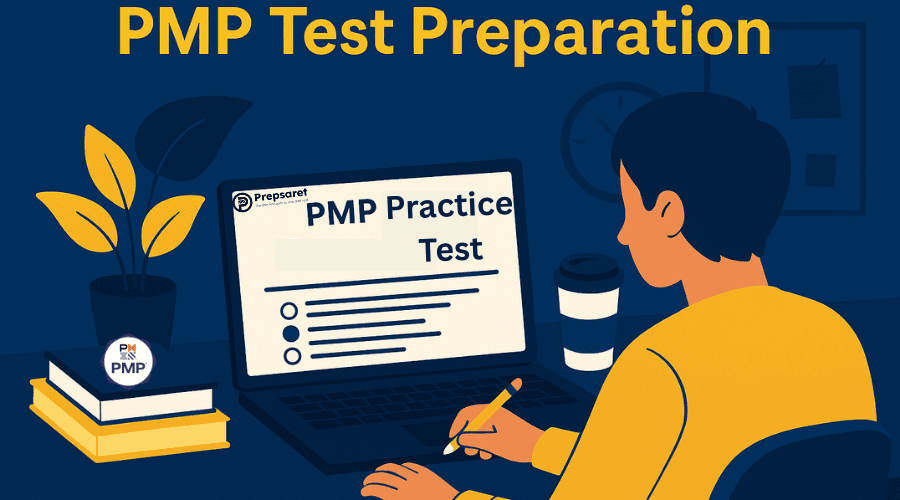Preparing for the PMP® exam can feel like a daunting task, but with a well-structured study plan and the right resources, you’ll be on your way to acing it. Whether you’re a project manager looking to enhance your credentials or a professional aiming for career advancement, passing the PMP® exam is a critical step.
A solid study plan, combined with the right resources, is key to mastering the material and passing the exam. With Prepsaret’s comprehensive study tools, including practice exams and study notes, you can confidently prepare for the PMP® exam. Start your preparation today!
How to Apply for PMP Certification
Before you begin preparing for the project management professional PMP exam, you need to ensure you’re eligible to take it. The Project Management Institute (PMI) has specific requirements that all candidates must meet.
Eligibility Requirements
To apply for the PMP certification, you must meet the following PMP exam requirements:
- Have a four-year degree with 36 months of project management experience, or
- Have a high school diploma or associate’s degree with 60 months of project management experience
- Complete 35 contact hours of project management education
Many project managers struggle to determine if they qualify. Take time to review your job history and identify project-related work. Engineers, IT specialists, and business professionals often have more relevant experience than they realize.
Application Process
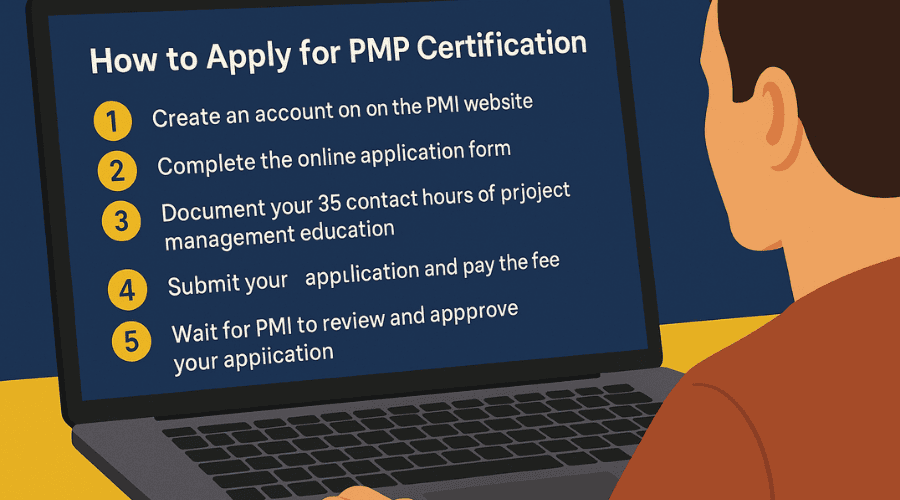
Once you decide to pursue your PMP certification, follow these steps to submit your application:
- Create an account on the PMI website
- Complete the online application form, detailing your project management experience
- Document your 35 contact hours of project management education
- Submit your application and pay the fee
- Wait for PMI (project management body) to review and approve your application
Once your payment is processed, you can schedule your PMP® exam online. Choose the date and location (online or in-person) that best fits your schedule.
PMI may select your application for audit, so be prepared to provide documentation of your experience and education. Many students find this part stressful, but with proper preparation, you can manage this process effectively.
PMP Exam Simulator: Your Key to Success
One of the best ways to assess your knowledge and readiness for the project management professional exam is through practice exams. Practice exams are essential to assess your knowledge and readiness before the actual test.
Benefits of Using a PMP Exam Simulator
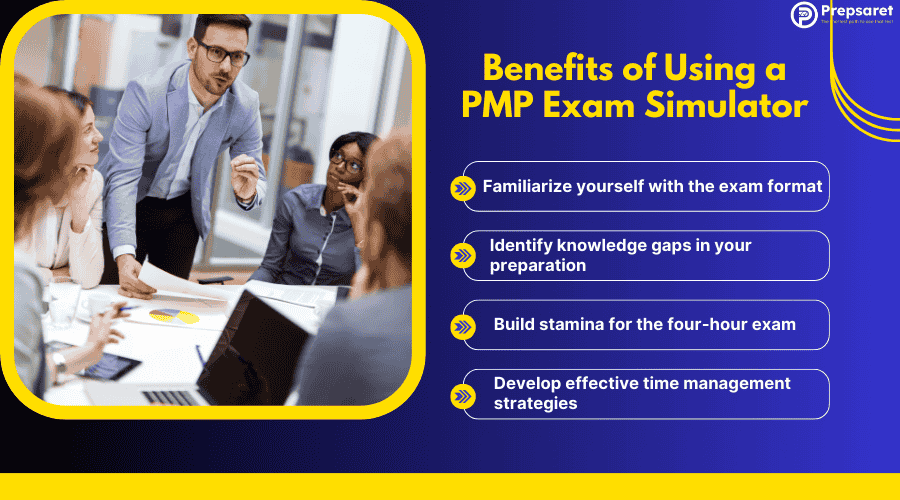
- Familiarize yourself with the exam format and question types
- Identify knowledge gaps in your preparation
- Build stamina for the four-hour exam
- Develop effective time management strategies
- Reduce test anxiety through repeated practice
Prepsaret’s PMP exam simulator offers 900 practice questions with detailed rationales for each answer. This comprehensive resource helps you understand not just what the correct answer is, but why it’s correct – a key thing that makes all the difference in your preparation.
Here’s how it can help you:
- Realistic Exam Environment: The simulator creates a real exam atmosphere, allowing you to get used to the timing, question formats, and difficulty levels you’ll encounter on exam day.
- Detailed Rationale for Each Answer: Every practice question comes with a detailed explanation for why a particular answer is correct. This helps you understand the reasoning behind the correct responses, which is crucial for retaining knowledge.
- Track Your Progress: As you complete practice exams, you can track your progress and identify areas where you need to focus more effort. This ongoing assessment ensures you’re prepared to tackle any challenge on the actual exam.
How to Use a PMP Exam Simulator Effectively
To get the best results from your practice exams:
- Start with topic-specific quizzes to assess your knowledge in different areas.
- Progress to full-length mock exams to build stamina
- Review all questions, even those you answered correctly
- Focus on understanding the reasoning behind each answer
- Track your progress to identify patterns in your mistakes
Taking regular practice tests will help you determine your readiness and identify areas that need more focus before exam day.
Online PMP Exam Prep
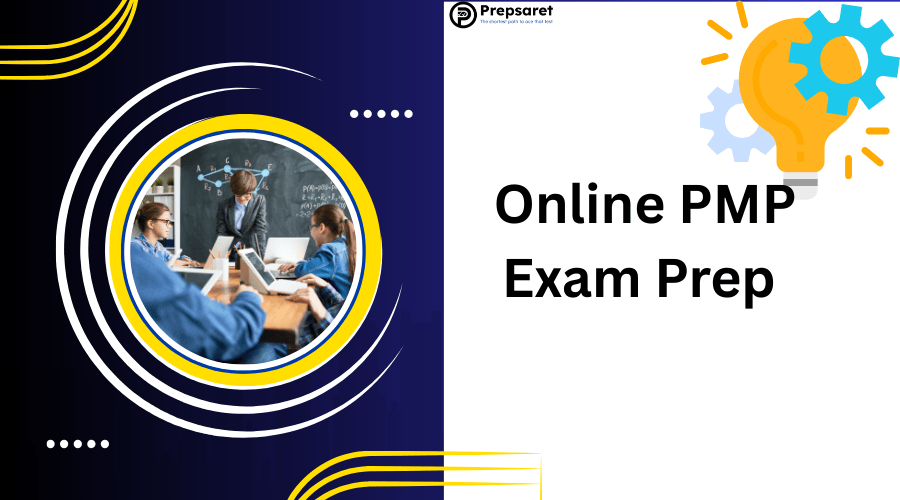
The digital age has transformed how professionals prepare for certification exams. Online PMP exam prep offers flexibility and comprehensive resources that traditional methods can’t match. The flexibility of online learning has made PMP® exam preparation easier than ever.
With self-paced online courses, you can fit your study sessions around your work and personal life.
Advantages of Online Preparation
- Study at your own pace and on your own schedule
- Access updated materials that reflect the latest version of the exam
- Interact with other candidates through forums and study groups
- Save time and money on commuting to in-person classes
- Track your progress automatically
Prepsaret’s online PMP exam prep includes access to practice questions and comprehensive study notes. These resources make it easier to manage your preparation process and stay on track.
Staying Motivated During Online Study
Maintaining motivation during self-paced study can be challenging. Here are some strategies to help:
- Create a detailed study schedule with specific goals
- Find a study partner or join an online study group
- Reward yourself after completing significant milestones
- Take short breaks to avoid burnout
- Regularly review your progress to see how far you’ve come
With the right approach, online preparation can be more effective than traditional methods for many candidates.
PMI Study Hall and On-Demand PMP Exam Prep
PMI Study Hall and PMI Authorized On-Demand PMP® Exam Prep are two excellent resources that complement other study methods. Here’s how they can enhance your preparation:
PMI Study Hall
PMI Study Hall offers a variety of interactive study tools, including practice questions and learning modules. It’s a great way to stay engaged and review key concepts in depth. PMI Study Hall is an official resource that provides:
- Performance insights to track your progress
- Learning resources aligned with the exam content
Many project managers find this resource valuable because it comes directly from the organization that develops the exam.
On-Demand PMP Exam Prep
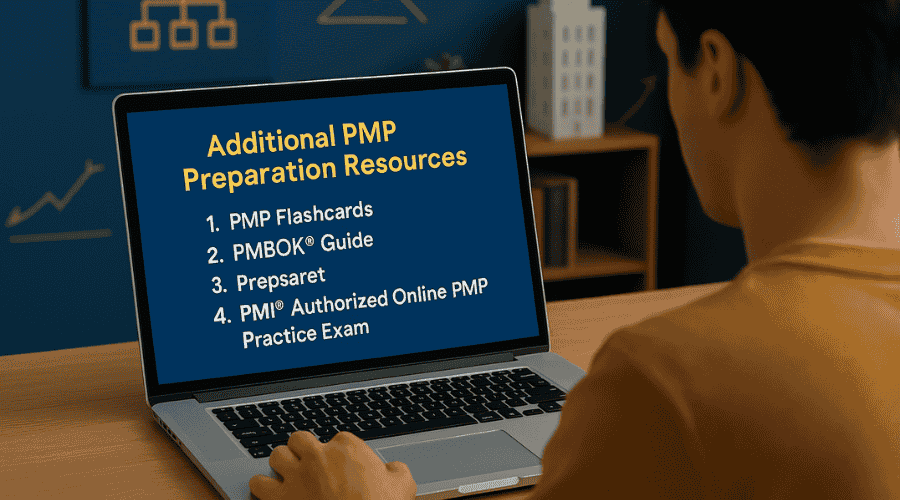
This flexible option allows you to access PMP® exam prep materials anytime and anywhere. It’s ideal for learners who prefer self-directed study but still want access to high-quality resources. This official training option includes:
- Comprehensive coverage of exam topics
- Interactive exercises to reinforce learning
- Access to experienced instructors
- Alignment with the latest exam content outline
While these resources require an investment, they provide valuable insights into PMI’s expectations for the exam.
The PMBOK® Guide: Your Key Resource for PMP Exam Prep
The PMBOK® Guide is a cornerstone of PMP® exam preparation, offering valuable insights into the essential concepts, processes, and best practices that will be tested. To use it effectively, it’s important to approach it with a clear strategy.
Understand Its Structure
The PMBOK® Guide is organized around process groups and knowledge areas, and understanding its structure is vital. Familiarize yourself with the different process groups (Initiating, Planning, Executing, Monitoring & Controlling, and Closing) and how they relate to the various knowledge areas.
This understanding helps you see the bigger picture and connect processes effectively, which is crucial for the exam.
Master Key Concepts
The guide covers a wide array of project management knowledge, and grasping key concepts like earned value management (EVM), risk management, and communication processes is essential.
These concepts will frequently appear on the exam, and knowing them thoroughly will give you the confidence to tackle scenario-based questions. Focus on how each concept applies in real-world project management situations.
Review Regularly
The PMBOK® Guide is dense, and it’s easy to get overwhelmed. Don’t rush through it—regular review is critical to retention. Revisit the material consistently to ensure that you’ve internalized the key information. This will reinforce your understanding and allow you to recall important details more easily when it counts during the exam.
Effective Use of the PMBOK® Guide
To maximize your study time:
- Read the guide in its entirety at least once.
- Create flashcards for key terms and definitions to aid memorization.
- Draw diagrams to visualize how processes relate to each other.
- Focus on understanding process flows, rather than just memorizing details.
- Regularly revisit key concepts across all knowledge areas.
Remember, the project management professional exam tests your ability to apply these concepts in real-life project scenarios, not just recall information. Use the PMBOK® Guide as a tool to develop this understanding, and it will be an invaluable asset in your preparation.
Developing a PMP Exam Study Strategy
A well-structured study plan is crucial for PMP exam success. Without a clear strategy, many candidates struggle to cover all necessary material or fail to manage their time effectively. Here’s how to develop a study plan that sets you up for success:
Creating Your Study Schedule
When creating your PMP study plan, consider the following factors:
- Your current knowledge level: Assess how familiar you are with project management concepts. If you have prior experience, your study time may be shorter.
- Available study time per week: Be realistic about how many hours you can dedicate each week.
- Learning style and preferences: Whether you prefer visual aids, videos, or hands-on practice, choose study methods that suit your style.
- Target exam date: Set a clear exam date and work backward to create a study schedule.
- Work and personal commitments: Make sure to account for your job and personal life when allocating study time.
Most successful candidates begin their preparation 8-12 weeks before the exam. Your timeline may vary depending on your experience and availability, but starting early will give you ample time to cover all material.
How Long Should You Study for the PMP Exam?
On average, candidates need 200-300 hours of study time. This can be broken down into:
- 2-3 months of full-time study, or
- 4-6 months of part-time study
Be realistic about how much focused study you can commit to each week. It’s not just about the quantity of time, but the quality of your study sessions.
An intense focus on practice questions and strong test-taking skills would also be essential. However, this accelerated timeline may be difficult for most professionals to manage, especially when balancing work commitments alongside such a demanding study schedule.
Master the PMBOK® Guide
The PMBOK® Guide should be your primary resource. To make the most of it:
- Read one chapter at a time.
- Take notes on key processes, inputs, tools, techniques, and outputs (ITTOs).
- Create process flow diagrams to visualize connections between processes.
- Regularly review and connect concepts across knowledge areas.
A thorough understanding of the PMBOK® Guide will provide a strong foundation for your exam preparation.
Explore Additional Study Resources
Complement the PMBOK® Guide with other resources:
- PMP exam prep course
- Video courses
- Study groups and online forums
- Flashcards for key terms
These additional resources will reinforce your learning and help explain complex concepts from different angles.
Maximize Your 35 Contact Hours of Project Management Training
Your required 35 hours of project management training should:
- Cover all knowledge areas in the PMBOK® Guide
- Include practice questions for application
- Provide opportunities for discussion and clarification
- Offer additional resources for further study
Select a course that aligns with your learning style and gives you comprehensive coverage of the exam material.
Regularly Take Practice Exams to Track Progress
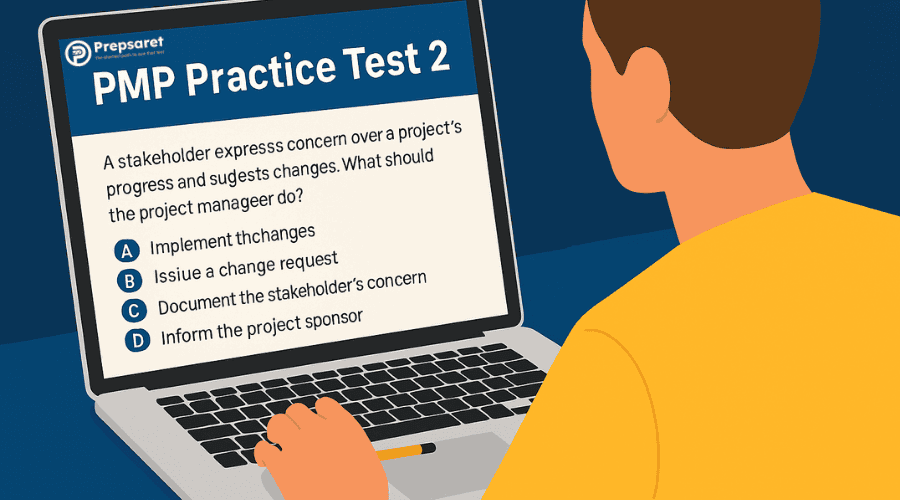
Practice exams are essential for:
- Assessing your knowledge level
- Identifying weak areas
- Building exam stamina
- Improving time management
- Reducing test anxiety
Taking practice exams simulates the real exam environment, allowing you to refine your test-taking skills. Prepsaret offers high-quality mock exams that mirror the format and difficulty of the actual test. Regularly taking these practice exams will help you track your progress and boost your confidence.
Why Choose Prepsaret for PMP Test Preparation
When selecting resources for your PMP test preparation, Prepsaret stands out for several reasons.
Comprehensive Resources
Prepsaret offers:
- Realistic practice exams that mirror the actual PMP exam
- Free test practice questions to assess your knowledge
- Detailed study notes covering all exam topics
- Quizzes at the end of each lesson to reinforce learning
- Up-to-date materials reflecting the latest exam content
These tools help you prepare more efficiently and effectively for the challenging PMP exam.
Strategies for Memorizing and Understanding PMP Concepts
The PMP exam requires both memorization and conceptual understanding. Balancing these aspects is essential for success.
How to remember PMP inputs and outputs (ITTO)
Instead of trying to memorize every ITTO:
- Focus on understanding the logical flow of processes
- Identify patterns across process groups
- Create visual maps showing relationships between processes
- Study the most commonly tested ITTOs first
- Use mnemonic devices for complex sequences
This approach makes learning ITTOs less overwhelming and more effective.
Know your processes, process groups, and documents
To master these elements:
- Create a process chart showing all 49 processes across the five process groups
- Understand how each knowledge area interacts with process groups
- Identify key documents generated in each process
- Practice explaining the purpose of each process
- Review the relationships between processes regularly
This knowledge forms the backbone of the PMP exam content.
PMP formulas to memorize
Several earned value management and other formulas are essential for the exam:
- Cost Performance Index (CPI) = EV/AC
- Schedule Performance Index (SPI) = EV/PV
- Estimate at Completion (EAC) = BAC/CPI
- Communication channels = n(n-1)/2
- Expected monetary value = Probability × Impact
Create flashcards for these formulas and practice applying them to sample problems regularly.
Related post: How to Pass Your PMP Exam
FAQs
Yes, the PMP exam is challenging. It requires significant preparation, critical thinking, and application of knowledge. The pass rate is approximately 60-70%. However, with dedicated study and the right resources, it's definitely achievable with hard work. Two months can be sufficient if you can dedicate 15-20 hours per week to focused study. This timeline works best for candidates with substantial project management experience who are already familiar with many of the concepts. Passing the PMP exam in three weeks is possible, but it’s highly challenging. To achieve this, you would need to dedicate 25-30 hours of study per week, have prior project management experience, and be familiar with PMBOK® concepts. Is the PMP Exam Hard to Pass?
Is 2 Months Enough to Study for PMP?
Can I Pass PMP in 3 Weeks?
Start Your PMP Test Preparation Today!
Beginning your PMP test preparation journey is a significant step toward advancing your project management career. With a structured study plan and quality resources like those offered by Prepsaret, you can approach the exam with confidence.
Remember that success on the PMP exam isn’t just about memorization—it’s about understanding project management principles and applying them to real-world scenarios. Begin your preparation today with Prepsaret’s PMP practice exams to track your progress.

